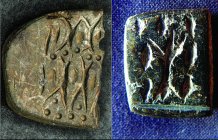
Local communities responsible for birth of farming in Central Turkey, archaeological excavations show
Local communities responsible for birth of farming in Central Turkey, archaeological excavations show
Local communities were responsible for the beginning of farming in Central Turkey 10,000 years ago and not migrants, archaeologists have discovered.
New excavations show foreigners did not introduce crop growing to the region. Instead locals experimented with food production themselves, and started herding animals.
Experts have discovered the evidence of cereals and legumes in Boncuklu in Turkey’s Anatolian plateau and the analysis of the remains and ancient DNA suggests the area was farmed by an indigenous population, rather than migrants from agricultural communities outside of Anatolia. Analysis of sheep and goat remains show ancient communities experimented in the way these animals were herded.
Professor Douglas Baird, from the University of Liverpool, who led the research, said: “Confounding the expectations of some archaeologists that the migrant farmer brought farming to central Anatolia, our evidence shows that the site of Boncuklu was occupied by long present, local Anatolian communities who mostly hunted and gathered a wide range of wetland animals and plants, but adopted farming from areas to the south and east through exchange.”
Dr Sarah Elliott, from the University of Exeter, also involved in the study, said: “Through excavations and analysing a combination of macroscopic and microscopic plants alongside ancient DNA we have found those living in Boncuklu adopted the cultivation of cereals and legumes. This is compelling evidence for early food production in Central Anatolia and in these communities farming was implemented by indigenous Anatolian foragers obtaining its cultivars from elsewhere, rather than people moving into the region.”
Archaeologists found people processed wheat in the same place it was grown. Boncuklu is a wetland area and some distance from the habitats in which wild cereals would have grown naturally. But even though wheat, lentils and peas were grown, the communities did not manage to domesticate them and they would have only contributed a small amount to their diet.
Project Co-Director, University of Queensland Associate Professor Andrew Fairbairn, said: “Unexpectedly, this low level food production persisted for at least five centuries. Archaeologists usually consider these kinds of food production systems to be short-lived and transitional, but our research suggests a stable and persistent use of crops and herd animals as a minor part of the economy for a long time. This does not fit existing theory.”
Research shows other communities in the region didn’t adopt the same agricultural practices. The team compared their findings in Boncuklu with the results of excavations in the nearby site of Pınarbaşı, excavated by Professor Baird from 2003 to 2004. Communities living there resisted the adoption of farming and maintained a hunter-gatherer lifestyle.
Professor Baird, from the University of Liverpool’s Department of Archaeology, Classics and Egyptology, said: “Intriguingly, while Pınarbaşı was abandoned and its people disappeared from the archaeological record, we believe that the way of life we see at Boncuklu contributed directly to that conducted at the slightly later Neolithic settlement, Çatalhöyük.
“Farming at Boncuklu was a relatively minor economic activity 10,000 years ago, but its adoption may have had both immediate and long-term consequences for the particular communities who committed to it.”
Funded by the British Academy, the British Institute at Ankara and the Australian Research Council, the research is published in the journal Proceedings of the National Academy of Sciences of the USA (PNAS).
It was conducted by an international team led by Professor Baird and Associate Professor Andrew Fairburn, and included researchers from Bournemouth University, University College London, the University of Exeter, Cornell University, Middle Eastern Technical University Ankara, Thrakya University, Bulent Ecevit University Zonguldak, Peking University and Harvard University.
As part of the project an experimental area has been developed, including reconstructed Neolithic houses, with plans to develop a Neolithic ‘garden’.
Professor Baird added: “We are keen to communicate our results to local communities in Turkey as well as international visitors.”
Date: 21 March 2018
